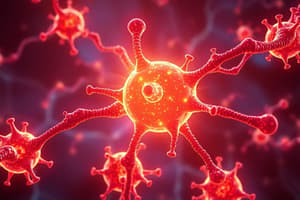Podcast
Questions and Answers
Which type of therapy focuses on modifying thoughts and behaviors that affect pain perception?
Which type of therapy focuses on modifying thoughts and behaviors that affect pain perception?
- Heat Therapy
- Cognitive Behavioral Interventions (correct)
- Nonpharmacological Measures
- Exercise Therapy
What is the primary effect of activation of mu opioid receptors?
What is the primary effect of activation of mu opioid receptors?
- Dysphoria
- Sedation
- Analgesia (correct)
- Modulation of Pain
Which of the following is a first-line medication used to treat acute opioid toxicity?
Which of the following is a first-line medication used to treat acute opioid toxicity?
- Morphine
- Acetaminophen
- Ibuprofen
- Naloxone (correct)
Which of the following is NOT a major type of opioid receptor?
Which of the following is NOT a major type of opioid receptor?
How do kappa receptors primarily contribute to the analgesic process?
How do kappa receptors primarily contribute to the analgesic process?
What is one potential benefit of using nonpharmacological measures in pain management?
What is one potential benefit of using nonpharmacological measures in pain management?
Which characteristic describes delta receptors in the context of pain management?
Which characteristic describes delta receptors in the context of pain management?
Which of the following is specifically contraindicated during pregnancy?
Which of the following is specifically contraindicated during pregnancy?
What is the primary mechanism of action for Celecoxib?
What is the primary mechanism of action for Celecoxib?
Which statement is true regarding Diclofenac?
Which statement is true regarding Diclofenac?
Indomethacin is known for which of the following properties?
Indomethacin is known for which of the following properties?
Which of the following points is a caution for patients using Celecoxib?
Which of the following points is a caution for patients using Celecoxib?
In patients with kidney disease, which medication requires additional renal dosing parameters?
In patients with kidney disease, which medication requires additional renal dosing parameters?
What is an advised precaution when using oral medications derived from COX-1 inhibition?
What is an advised precaution when using oral medications derived from COX-1 inhibition?
What is a significant risk associated with daily use of naproxen?
What is a significant risk associated with daily use of naproxen?
Which receptor is primarily targeted by opioids to reduce pain stimuli?
Which receptor is primarily targeted by opioids to reduce pain stimuli?
Which of the following side effects is NOT typically associated with opioid usage?
Which of the following side effects is NOT typically associated with opioid usage?
What condition makes the use of naproxen particularly risky?
What condition makes the use of naproxen particularly risky?
During which stage of pregnancy is naproxen contraindicated?
During which stage of pregnancy is naproxen contraindicated?
Which symptom can occur as a result of opioid poisoning?
Which symptom can occur as a result of opioid poisoning?
What potential complication can result from opioid-induced smooth muscle spasm?
What potential complication can result from opioid-induced smooth muscle spasm?
Which side effect is specifically attributed to the release of histamine and not a type 1 hypersensitivity reaction?
Which side effect is specifically attributed to the release of histamine and not a type 1 hypersensitivity reaction?
What is the recommended dose adjustment when converting to a new opioid to avoid overdose?
What is the recommended dose adjustment when converting to a new opioid to avoid overdose?
Which of the following is a significant risk factor when combining tramadol with certain antidepressants?
Which of the following is a significant risk factor when combining tramadol with certain antidepressants?
Buprenorphine is classified as which type of opioid?
Buprenorphine is classified as which type of opioid?
Which condition should tramadol not be used in?
Which condition should tramadol not be used in?
What is a specific precaution for tramadol when prescribing to children?
What is a specific precaution for tramadol when prescribing to children?
What specific effect does buprenorphine have that differentiates it from other opioids?
What specific effect does buprenorphine have that differentiates it from other opioids?
Why should tramadol be avoided in patients with severe hepatic impairment?
Why should tramadol be avoided in patients with severe hepatic impairment?
Which of the following medications is a concern for interaction with tramadol?
Which of the following medications is a concern for interaction with tramadol?
What is the primary therapeutic use of Buprenorphine + Naloxone?
What is the primary therapeutic use of Buprenorphine + Naloxone?
For which indication is Nalbuphine primarily used?
For which indication is Nalbuphine primarily used?
Which of the following correctly describes Buprenorphine's action?
Which of the following correctly describes Buprenorphine's action?
Which statement regarding Mu and Kappa receptors is incorrect?
Which statement regarding Mu and Kappa receptors is incorrect?
Which of the following medications is least likely to be used for managing opioid-induced itching?
Which of the following medications is least likely to be used for managing opioid-induced itching?
Study Notes
Complementary and Alternative Therapies for Pain Management
- Cognitive behavioral interventions can help change thoughts and behaviors that contribute to pain perception.
- Examples of complementary and alternative therapies for pain include acupuncture, TENS, yoga, massage, heat, ice, and distraction.
Opioid Receptors
- There are three main types of opioid receptors: mu, kappa, and delta.
- Mu receptors are primarily responsible for analgesia, respiratory depression, and physical dependence.
- Activation of mu receptors is the primary mechanism of action for most opioid analgesics.
- Kappa receptors contribute to analgesia, sedation, and dysphoria.
- Kappa receptors are less potent than mu receptors and have a lower risk of dependence.
- Delta receptors may contribute to analgesia and pain modulation, but their role is less understood.
- Understanding the different opioid receptor types is crucial for effective pain management, allowing prescribers to select medications based on the specific type of pain and minimize side effects.
Opioid Antagonists
- Naloxone is a pure opioid antagonist that treats opioid overdose by blocking the effects of opioids. It does not have any pharmacological activity in the absence of opioids.
- Naloxone is administered to reverse the effects of opioid overdose, including respiratory depression, sedation, and hypotension.
- Providers should consider prescribing naloxone for patients at risk for opioid overdose.
- Naloxone is now available over the counter.
NSAIDs
- NSAIDS are nonsteroidal anti-inflammatory drugs that are used to treat pain.
- NSAIDS inhibit prostaglandin synthesis, primarily by inhibiting COX-1 and COX-2. COX-1 is involved in the production of prostaglandins that protect the stomach lining, while COX-2 is involved in the production of prostaglandins that contribute to inflammation and pain.
Opioids
- Opioid analgesics interact with mu, kappa, delta, or sigma receptors to reduce cAMP, which closes Ca++ channels and stops pain neurotransmitters like glutamate and substance P from being released.
- Opioids bind primarily to supraspinal and spinal mu receptors, reducing ascending pain pathways.
- Common side effects of opioids include nausea, vomiting, constipation, euphoria, lethargy, itching, opioid poisoning (coma, apnea, pinpoint pupils), sphincter of Oddi spasm, smooth muscle spasms of ureters and bronchioles, opioid-induced myoclonus or neurotoxicity, depression of the cough reflex, and miosis (pupillary constriction).
- High doses of opioids (over 50 mg morphine equivalents per day) increase the risk of overdose.
- When converting between different types of opioids, the dose should be reduced between 25%-50%.
Tramadol
- Tramadol and its metabolite bind to the mu opioid receptor and inhibit the reuptake of serotonin and NE.
- It is used to treat moderate to severe chronic pain.
- Side effects include Bradypnea and seizures.
- Tramadol should not be used in children or in individuals with severe hepatic impairment.
Partial Opioid Agonist/Antagonists
- Buprenorphine: Kappa agonist and mu antagonist used to treat moderate to severe pain and opioid dependence. It has a ceiling effect and is not for chronic pain control.
- Butorphanol: Kappa agonist and mu partial agonist/antagonist used to treat pain and for pre-anesthesia sedation.
- Nalbuphine: Mu agonist and kappa antagonist used to treat moderate to severe pain and for pre-op sedation.
Opioid Summary
- Analgesics: Opioids work by interacting with opioid receptors to reduce pain perception.
- Partial opioid agonist/antagonist: These drugs have mixed effects on opioid receptors, providing pain relief with a reduced risk of dependence and side effects.
Studying That Suits You
Use AI to generate personalized quizzes and flashcards to suit your learning preferences.
Related Documents
Description
This quiz explores complementary and alternative therapies for pain management alongside the role of opioid receptors in healthcare. Understand how different interventions like acupuncture and cognitive behavioral tools can influence pain perception, as well as the mechanisms of mu, kappa, and delta receptors. Gain insights into effective pain management practices and the pharmacology of opioids.





